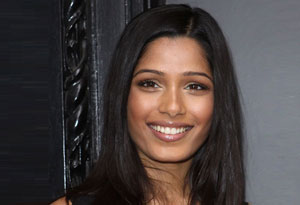Freida Pinto's Aha! Moment

Photo: David Oldham/August
The star of Woody Allen's latest film once thought her complexion was "a curse," until a chance encounter with a stranger made her realize just how lucky she was.
I'm from a culturally rich and diverse nation, India. We speak many languages and have unimaginable variety in our traditional cuisine. People in the north look completely different from those in the south—sometimes it's hard to believe we all come from the same country. But there is one disturbing notion prevalent throughout India: that light skin is more attractive than dark. And as someone who has what Indians call a dusky complexion, I used to think there might be truth to that. When you doubt one thing about yourself, you start thinking there's also something wrong with your hair, your body, your clothes, your accent—everything. A few years ago, my modeling agency asked me to audition for skin-lightening commercials. I knew those products were wrong, so I'd show up with a burden in my heart, thinking, "I can't believe I'm doing this." Those commercials sent out a message that if your skin is lighter, you are more acceptable to society. The strangest part was that the people creating these negative images were some of the most attractive dark-skinned people I have seen. They always rejected me for the ads, and I'm glad they did.
Before my first movie, Slumdog Millionaire, I hadn't traveled outside Southeast Asia. But while promoting the film, I went on a world tour and interacted with people of many different ethnicities. One day I was checking in at my Los Angeles hotel and a woman who was as pale as pale can be said to me, "I'd love to have your skin color. It's so beautiful!" I thought, "What? Where I come from people want to be your color, lady." I wish all Indian girls could have heard her say that.
Then something just clicked. I thought, "I'm going to stop thinking my complexion or accent isn't good enough." Then and there I decided to be happy with what I have.
In my travels, I've seen that self-doubt is not just an Indian problem. All people—African, European, American—worry about being different. But I've learned that the traits we'd rush to get rid of are the very ones that others desire. People always covet what they don't have. That's why we should look at ourselves every now and then and say, "I'm proud of myself. I like the way I'm made."
Next: Join O's beauty revolution and learn how to tackle your toughest critic



